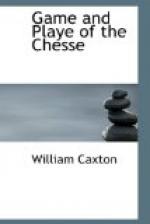The biblical allusions may be taken as typical. There are references to the “bible,” “holy scripture,” “Ecclesiastes,” and “Canticles.” There also occur the names of Adam, Eve, Abel, Cain, Noah, Ham, Lot, David, Abner, Joab, Abishai, Solomon, Isaiah, Evilmerodach, Belshazzar, Darius, Cyrus, Tobias, John the Baptist, and Paul. The citations are not all literally exact. Solomon had not a very good opinion of his fellow-men; but the comprehensive estimate of the number of fools with which he is credited on p. 3 is not to be found in the writings canonically attributed to him. The quotation from the Canticles on p. 25 may be compared with the translation in the Wicliffite verfion made by Nicholas de Hereford, A. D. 1380. This passage is rendered: “His left hond is vndur myn heed; and his ri3t hond shal biclippe me” ("Song of Solomon,” ii. 6). Clip is still current in Lancashire, in the sense of embrace.
The extract from St. Paul, with which the prologue to the second edition opens, is no doubt intended for the following passage: “All Scripture is given by inspiration of God, and is profitable for doctrine, for reproof, for correction, for instruction in righteousness” (2 Tim. iii. 16).
In the reference to the Athenians (p. 16), we seem to hear an echo of the words: “For all the Athenians and strangers that were there spent their time in nothing else, but either to tell or to hear some new thing " (Acts xvii. 21).
The most curious reference to a biblical personage is that relating to Evilmerodach (p. 10). Cessoles seems to have been the first to associate the name of the son of Nebuchadnezzar with the invention of the game of chess. The biblical references to Evilmerodach are few; they throw no light on the reason of his selection by the mediaeval scribe for a bad pre-eminence of parricide. The epithet of joli applied to the king has an odd effect, followed as it is by the narrative of his most unfilial conduct. Dr. Van der Linde shows how widely the legend spread. Lydgate evidently hesitates between the divided authority of Guido—that is, Colonna, the author of the Troy book—and Cessoles, whom he quotes through Jacobus de Vitriaco.[23]
Amongst the authors not identified are “Crete” (p. 133), and Diomedes (p. 10). The account of the origin of chess attributed to the last is amplified a little further on. The legend that Palamedes invented a game of this kind at the siege of Troy is emphatically rejected by our author, who pins his fame on Xerxes, a Greek philosopher! This became the received opinion, as may be gathered from the unhesitating language of Polydore Vergil in a passage which is thus rendered by John Langley:—“The chesse were invented the year of the world 3635, by a certain Wise man called Xerxes, to declare to a Tyrant, that Majesty or Authority without strength, assistance & help of his subjects, was casual feeble & subject to many calamities of fortune; his intent was to break the fierce cruelty of his heart, by fear of such dangers as might come to passe in the life of man.” [24]




